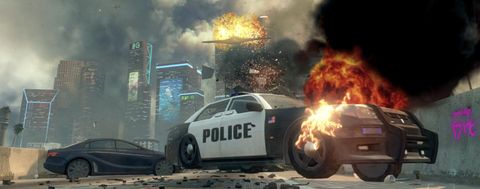Our Verdict
Though hokey, tired and periodically shambolic, the campaign has a few new tricks, but its the fulsome multiplayer that saves Blops 2 from shame.
PC Gamer's got your back
Everybody's second-favourite Call of Duty sub-franchise returns, picking through the carnage of the preceding game's CIA conspiracy while simultaneously barrelling onward into the cyber-enhanced future-war of 2025.
The game flits between control of David Mason, son of the first Blops' protagonist, and flashbacks to (not terribly) covert missions taking place during the conflicts of the late 20th century. For the most part, it follows familiar Call of Duty rote: enemies swarm out and you pop their heads and push forward. Like Whack-a-mole, but with foreigners. You shoot men in 1980s Afghanistan. You shoot men and robots in future-LA. Hither and thither, men are shot, their demise serving a globe-trotting anti-terrorism yarn that would be amusingly ludicrous if it weren't laser-targeted to evoke actual middle-American paranoia.
But before we get to that: let me tell you about my horse. My horse keeps on falling through the ground. It doesn't fall far – just up to its flanks – but it's very hard to fend off a Russian assault on a half-buried horse. I can't get off my horse because I haven't quite reached the horse-dismounting checkpoint. I am stuck. I reload and reload and reload and eventually make it through.
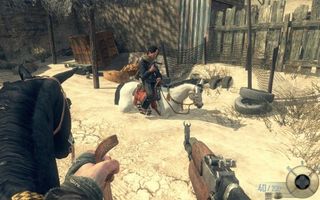
I mention this because my problem with Blops 2 and CoD in general is not that they are cinematic shooters of little mechanical imagination or meaningful interactivity – I'm completely cool with that. CoD is essentially Duck Hunt with multidirectional movement and a hysterically self-pitying, bellicose view of global politics. That's OK. That's allowed. But I take issue when I repeatedly crash through its flimsy world into the unglamorous workings behind.
It's not even that Blops 2 is buggy: it's just so inflexible and brittle as to splinter at the most gentle pressure in any direction other than the one in which it is ordained to move. Playing it is to tiresomely re-analyse the ever-shifting boundaries of interaction. The very first level kills you if you stray outside the invisibly defined battle zone; later you are gifted with an entire canyon to roam – assuming your horse remains above ground level.
At one point, I found myself stuck on a beach while angry locals swarmed through the jungle behind. The sign above my AI partner said, 'Follow'. However, he had stopped. I'd been told there were some boats on the beach, which would seem like a mission-critical observation, were it possible to interact with them. “Keep running, Mason!” shouts my AI partner, apparently unaware that we are hemmed into this tiny sandy deathzone by invisible walls. Several reloads later, I discover that I have to press F on my companion and initiate an ending cutscene. Ah.
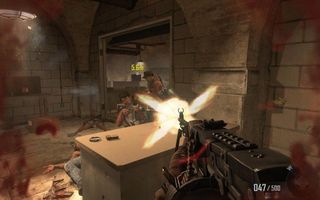
This seems like a shame because it torpedoes one of Black Ops 2's most ambitious endeavours. At key points during the game you are given choices which dramatically change its outcome. But so trammelled are you in the interim that you may not realise your own power.
When the opportunity arose to execute someone, I couldn't work out how to decline – or even if I could. I tried shooting other people in the room, but the gun just didn't fire. I tried to wait the decision out, but eventually I assumed there was only one interactive option available. Bang. Sorry. Deciding whether or not to kill someone should be dramatic, but here it felt more like attempting to interpret faded washing instructions. Can I tumble dry this?
Still, such pivotal moments, when they work, do perk interest in the otherwise daft plot as it maniacally flings itself around history, occasionally stamping on the bits of it wingnuts don't like. Despite all the techno-gobbledegook, conspiracy, brainwashing and betrayal, Black Ops 2 presents a paint-by-numbers world, in which the primary colours are fear, jingoism and self-righteous aggression. In this version of reality, Islamic terrorists are elided with South American socialists, hackers and anti-capitalist protesters.
The game's arch-villain, Raul Menendez, is a product of American interventionism gone awry, but if there's a warning there, it's subsumed by the batshit fervour of his personal quest for revenge. Menendez is not a nice man (you can tell because he has a scar) and his response to his violation by America is to go around yelling and kneecapping people, so it's hard to sympathise with him. That we are only encouraged to worry about American foreign policy inadvertently creating Menendez-like monsters is itself troubling, but I suppose people whose lives were just quietly and terribly fucked don't make exciting antagonists.
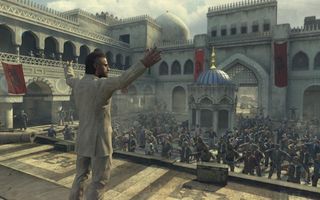
After this calamitous introduction to the campaign, however, Blops 2 settles down. Its set-pieces become more coherent (if not the plot) and the majority of its novelties work. Except this time, there are no egregiously annoying infinite spawns. Indeed, the game sidesteps many of the series' clichés. Turret sections are subverted almost the instant they begin, as are other staples: the slow-motion breach and clear, the last-second gun-toss.
Elsewhere, futuristic gadgetry brings welcome variety. You can target enemies with a fleet of drones or hunker behind shambling quadrupedal mechs. Their power is most visible in the radical addition of Strike Force, a simplistic RTS gamemode which runs in parallel to the campaign. Using a high-altitude view, you capture points, defend them, protect convoys and rescue hostages. At any point you can dive into the brain of a soldier or robot and take direct control. The major weakness is the AI – the lamentable pathfinding is all the more visible in the top-down view – but its incompetence obligates you to get your hands dirty, and so creates the delightful tension between strategy and ground tactics. It's messy, perhaps, but fun: rarely in a Call of Duty game do you get the entire toybox to play with all at once.
Black Ops 2 also manages occasional spectacle, despite a creaking engine. The recreation of a Yemeni hillside township is both visually and spatially fascinating, a wonderful chaos of alleys and stairwells, offering as much vertical variation as horizontal. Elsewhere, an exclusive, floating mega-resort has been taking notes from Brink's super-white sea-faring skyline – a dazzling, crisp utopia which is disturbingly cathartic to smash.
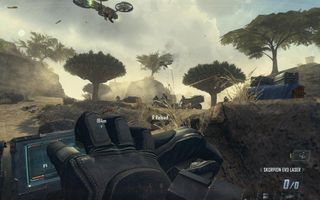
Exploring that Yemeni township is all the better in multiplayer. In fact, everything is better in multiplayer. Add a few real people, and levels that were inert backdrops to the campaign now reveal a more delicate construction: multiple strata and intertwining paths, every space run through with dozens of sightlines to keep you on your toes. On the deck of a burning aircraft carrier, your objective is to minimise your exposure, skipping between coverpoints, constantly craning this way and that to ensure you aren't being flanked. A railway station generates an ongoing flow of combat through multiple, looping routes. Rarely do you find a position which isn't in some way compromised, forcing continual movement.
Myriad multiplayer modes are divided and duplicated among a variety of playlists, although most of the new additions, like the roaming king-of-the-hill gametype Hardpoint, are fairly unadventurous reconfigurations of existing rulesets. The 'party game' playlist contains the most outlandish departures from regular Call of Duty gunplay – here you earn extra bullets with kills or automatically cycle through the game's armoury.
Treyarch have made some canny rebalancing decisions: the special rewards formerly known as Killstreaks have evolved into Scorestreaks. Helping your team with objectives now contributes to earning UAV surveillance, drone strikes and other devastating powers. The unlockable-arms-race seems less painful for new players, too, thanks to an ample starting kit.
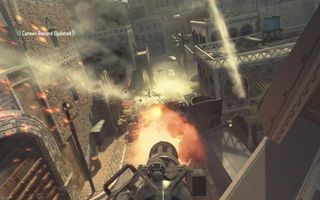
This is all to the good – but is it a reinvention worth $60/£40? The menus are biased toward gamepad controls and the lack of dedicated servers is regrettable. To my tastes, Battlefield 3 still remains a broader and deeper (and cheaper) online offering, zipping easily between grand vehicular modes and tight close-quarters firefights. And yet, perhaps because of Battlefield's wider focus, it doesn't quite deliver on the instantly gratifying bouts of hectic, adrenalising chaos that we see here.
Plus, Battlefield doesn't have zombies. Blops 2's horror-comedy wave-survival mode is its most elaborate yet: a series of four maps that can be played separately or as one. Each location is discretely contained, but visited periodically by a bus service which optionally takes players onto the next. While holding up in one location allows players to fortify it, upgrades and items may lure them onto the next stop. The bus won't wait, however, initiating a mad scramble every time players hear the insistent honking of its horn – a microcosm of Left 4 Dead's dramatic finales.
Killing Floor and Left 4 Dead offer comparable thrills, and arguably more refined mechanics, but this is nonetheless an admirable component of Call of Duty: Black Ops 2's formidable and mildly refreshed online package. Without it, the singleplayer's occasional innovations do little to elevate the formula from vapidity, or help forgive its unpalatable tenor.
Though hokey, tired and periodically shambolic, the campaign has a few new tricks, but its the fulsome multiplayer that saves Blops 2 from shame.
